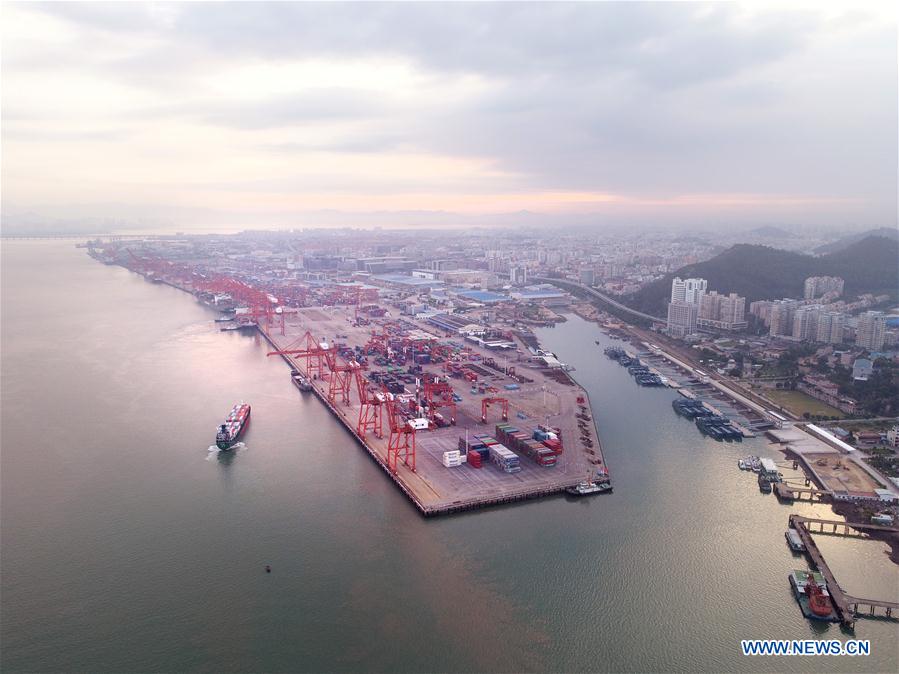Investors eye expanded China portfolios for opening-up dividends
From April, China's yuan-denominated bonds start to become part of the Bloomberg Barclays Global Aggregate Index (GAI), a global benchmark, giving investors greater access to the world's third-largest bond market.
The "most exciting changes" in global capital market history are taking place in China's financial landscape, with heavyweight players vying for stronger presence and promising returns.
Aerial photo taken on Aug. 26, 2017 shows a freighter entering the Dongdu port at Xiamen Area of China (Fujian) Pilot Free Trade Zone in Xiamen, southeast China's Fujian Province. [Photo/Xinhua]
"The opening of China's financial market may be one of the biggest and most exciting changes in the history of global capital markets," said Li Bing, head of Bloomberg China.
From April, China's yuan-denominated bonds start to become part of the Bloomberg Barclays Global Aggregate Index (GAI), a global benchmark, giving investors greater access to the world's third-largest bond market.
Milestone inclusion
A total of 356 yuan-denominated government and policy bank bonds will be added into the Bloomberg Barclays GAI over the next 20 months, making Chinese bonds the fourth largest currency component, following the U.S. dollar, euro and Japanese yen, after their full inclusion.
The inclusion "represents an important milestone for China as it continues to strengthen and liberalize its capital market and looks to attract more international investors," said Mark Leung, CEO of J.P. Morgan China.
This will be the "biggest change to the index since the introduction of the euro," which in itself speaks volumes about the potential implications, Li Bing said.
When fully implemented, China will make up approximately 6.06 percent of the index, using data as of January 31 this year.
As the Bloomberg Barclays GAI is widely tracked by global asset managers, the inclusion will lead to an inflow of overseas investment into the market.
"That step both reflects the importance of those bonds in foreign portfolios and will likely encourage more purchases of those securities going forward," said Changyong Rhee, IMF's director of the Asia and Pacific department.
According to a Bloomberg survey of more than 180 global investors in February, 64.4 percent of them planned to increase investment in China's domestic bond market this year, and a majority of them attributed the planned portfolio build-up to the inclusion.
Moody's forecasts that a full inclusion could potentially lead to an inflow of about 2 trillion U.S. dollars of funds.
Betting on new opportunities
The inclusion marks the latest step in opening China's financial market. The massive size and faster opening-up of the market generate opportunities few investors are willing to miss out on.
"The openness, competitiveness and influence of China's financial market have been growing and are widely recognized by the international market," China's central bank governor Yi Gang said at a forum last month.
Significant progress has been made in creating a more open and transparent China market for foreign inbound participation, Li Bing said. "Global investors are also encouraged by China's commitment to financial sector reforms to create a more level playing field for foreign financial services firms."
Thanks to the country's broader opening-up initiatives, German insurer Allianz Group has gained permission for the establishment of an insurance holding company in China, which is the country's first wholly-owned insurance holding company by a foreign insurer.
"China is central to our growth strategy in Asia," said George Sartorel, Allianz regional CEO for Asia Pacific. "We look forward to contributing to the continued development and innovation of China's fast-growing insurance sector."
Japan's leading brokerage Nomura Holdings plans to launch its newly-approved China joint venture within the year, taking advantage of rules to allow 51-percent foreign ownership of brokerages.
"We are confident that we can play a part in moving China's economy to the next level and help issuers raise funds and investors diversify their portfolios," said Toshiyasu Iiyama, head of China committee at Nomura Holdings, citing increasing demand from foreign firms and investors to raise funds and invest in China.
The country witnessed a net inflow of 43-billion-dollar overseas investment in its equity market last year, surging more than 10-fold from 2017, according to data from the State Administration of Foreign Exchange.
Vowing consistent stance on expanding financial opening-up, Yi Gang stressed five aspects, including opening up the financial service sector, full implementation of the pre-establishment national treatment plus negative list management system, and improvement of business environment.


